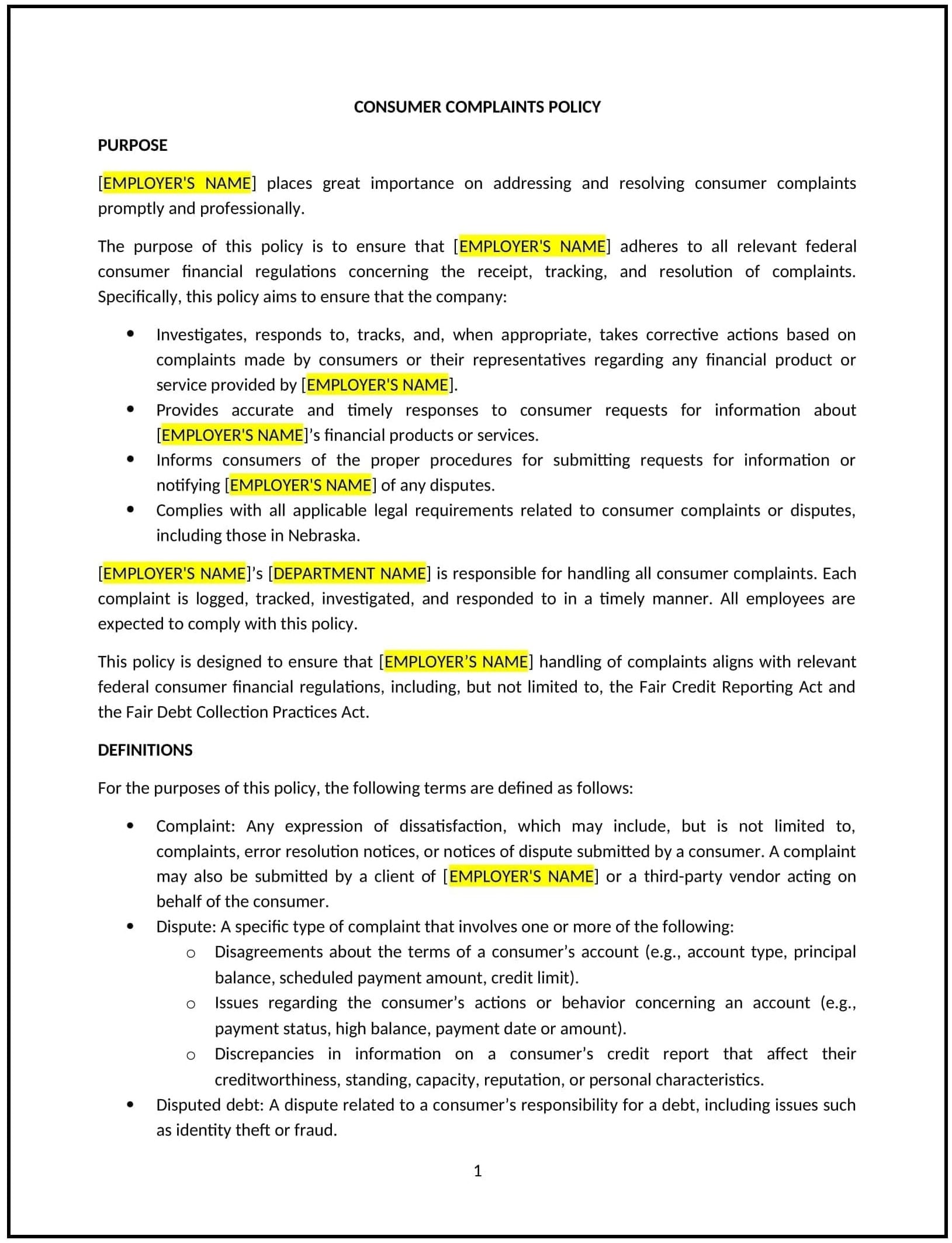Consumer complaints policy (Nebraska): Free template
Got contracts to review? While you're here for policies, let Cobrief make contract review effortless—start your free review now.

Customize this template for free
Consumer complaints policy (Nebraska)
A consumer complaints policy helps Nebraska businesses establish clear procedures for handling consumer complaints, ensuring that complaints are addressed in a timely, respectful, and fair manner. This policy outlines how consumers can submit their complaints, the process for investigating issues, and the steps taken to resolve complaints. It is designed to improve customer satisfaction, maintain a positive reputation, and build trust between the business and its consumers.
By adopting this policy, businesses in Nebraska can ensure a proactive approach to managing consumer concerns, turning potential issues into opportunities for improvement and customer loyalty.
How to use this consumer complaints policy (Nebraska)
- Define the types of complaints: Specify what constitutes a consumer complaint, such as issues with products, services, billing, customer service, or other aspects of the business.
- Set the reporting process: Outline the methods available for consumers to submit complaints, whether in person, via email, a dedicated website, or phone. Provide clear instructions on how complaints should be submitted and what information should be included.
- Establish response times: Set clear timelines for acknowledging and addressing complaints, ensuring that consumers receive prompt responses. For example, complaints should be acknowledged within 48 hours, and a resolution should be provided within a specified time frame (e.g., 14 days).
- Assign responsibility: Designate a team or individual responsible for handling consumer complaints, ensuring that complaints are addressed consistently and professionally.
- Investigate complaints: Outline how complaints will be investigated, including gathering necessary information, identifying the cause of the issue, and considering potential solutions.
- Provide resolutions: Clearly explain how the business will resolve complaints, whether through refunds, replacements, apologies, or other actions. Ensure that resolutions are fair and align with company policies.
- Offer escalation options: If a complaint cannot be resolved at the initial level, provide a process for escalating the issue to a higher authority within the business.
- Keep records: Maintain a log of consumer complaints, the investigation process, and the resolutions provided. This helps identify trends and improve the overall customer experience.
- Review and update: Periodically review and update the policy to reflect changes in consumer expectations, company operations, or Nebraska consumer protection laws.
Benefits of using this consumer complaints policy (Nebraska)
This policy provides several benefits for Nebraska businesses:
- Improves customer satisfaction: A clear, effective complaints process helps ensure that customers feel heard and valued, increasing their satisfaction and loyalty to the business.
- Reduces the risk of negative publicity: By addressing complaints quickly and fairly, businesses can prevent issues from escalating and potentially damaging the company’s reputation.
- Increases trust and transparency: A transparent and accessible complaints process builds consumer trust by demonstrating that the business is committed to resolving issues in a fair and timely manner.
- Identifies areas for improvement: Tracking and analyzing complaints helps businesses identify recurring problems, allowing for targeted improvements in products, services, or customer service practices.
- Complies with consumer protection laws: Adopting a formal consumer complaints policy helps ensure that the business follows Nebraska and federal laws related to consumer rights and dispute resolution.
Tips for using this consumer complaints policy (Nebraska)
- Communicate the policy clearly: Ensure that consumers are aware of how to submit complaints and the process involved. Include information about the policy on your website, in receipts, and through customer service channels.
- Acknowledge complaints quickly: Respond to all complaints promptly, acknowledging receipt and providing an estimated timeline for resolution. This shows consumers that their concerns are being taken seriously.
- Investigate thoroughly: Take the time to investigate complaints fully before providing resolutions. Ensure that the root cause of the issue is identified and addressed, not just the symptoms.
- Stay professional and empathetic: Approach every complaint with professionalism and empathy. Treat consumers respectfully and offer sincere apologies when necessary, even if the issue was beyond your control.
- Track trends: Regularly analyze complaint data to identify patterns or recurring issues, which may indicate areas where the business can improve products, services, or customer interactions.
- Review and update the policy regularly: Ensure the complaints process remains relevant to changing business practices, consumer expectations, and legal requirements. Review the policy annually to keep it up to date.